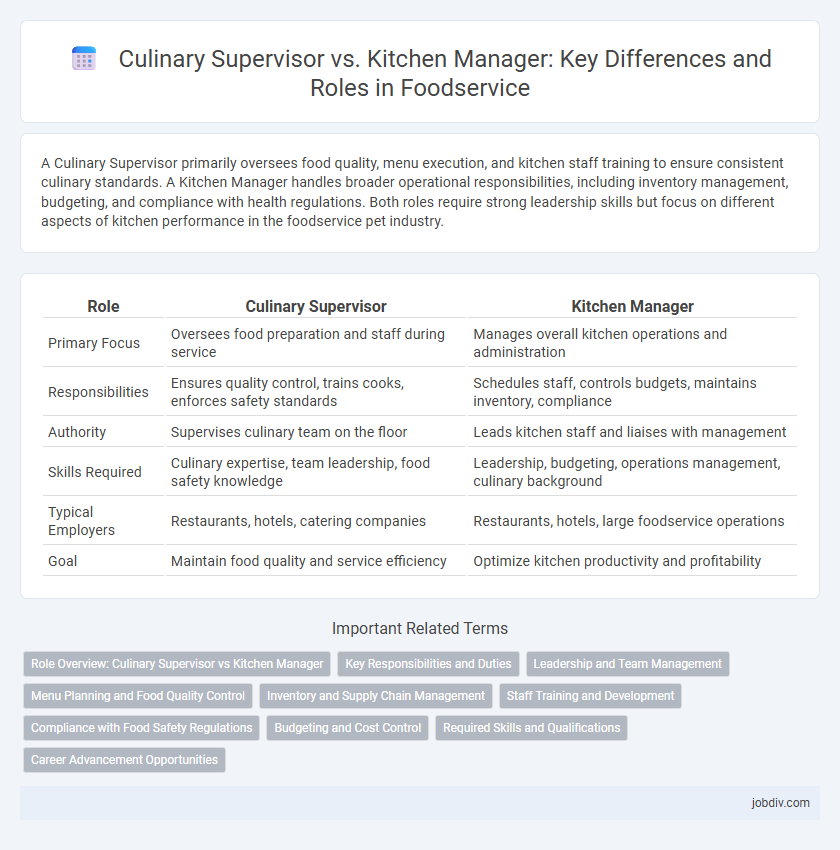A Culinary Supervisor primarily oversees food quality, menu execution, and kitchen staff training to ensure consistent culinary standards. A Kitchen Manager handles broader operational responsibilities, including inventory management, budgeting, and compliance with health regulations. Both roles require strong leadership skills but focus on different aspects of kitchen performance in the foodservice pet industry.
Table of Comparison
| Role | Culinary Supervisor | Kitchen Manager |
|---|---|---|
| Primary Focus | Oversees food preparation and staff during service | Manages overall kitchen operations and administration |
| Responsibilities | Ensures quality control, trains cooks, enforces safety standards | Schedules staff, controls budgets, maintains inventory, compliance |
| Authority | Supervises culinary team on the floor | Leads kitchen staff and liaises with management |
| Skills Required | Culinary expertise, team leadership, food safety knowledge | Leadership, budgeting, operations management, culinary background |
| Typical Employers | Restaurants, hotels, catering companies | Restaurants, hotels, large foodservice operations |
| Goal | Maintain food quality and service efficiency | Optimize kitchen productivity and profitability |
Role Overview: Culinary Supervisor vs Kitchen Manager
A Culinary Supervisor oversees food preparation processes, ensures quality control, and coordinates kitchen staff to maintain efficient workflow in foodservice operations. A Kitchen Manager focuses on broader kitchen management tasks such as inventory control, budgeting, staff scheduling, and compliance with health and safety regulations. Both roles require leadership skills, but the Culinary Supervisor is more involved in day-to-day culinary operations while the Kitchen Manager handles administrative and operational oversight.
Key Responsibilities and Duties
A Culinary Supervisor primarily oversees food preparation processes, ensuring quality control and adherence to recipes, while also training kitchen staff on safety and sanitation standards. In contrast, a Kitchen Manager handles overall kitchen operations, including inventory management, staff scheduling, and cost control to maintain budget efficiency. Both roles demand strong leadership, but the Culinary Supervisor focuses more on culinary execution whereas the Kitchen Manager emphasizes operational management and logistics.
Leadership and Team Management
Culinary Supervisors prioritize direct leadership by overseeing daily kitchen operations, ensuring staff adherence to safety and quality standards while providing hands-on guidance during food preparation. Kitchen Managers assume broader responsibilities, including strategic team management, staff scheduling, inventory control, and coordinating between kitchen and front-of-house management to optimize workflow efficiency. Both roles demand strong leadership skills, but Culinary Supervisors focus more on immediate team support, whereas Kitchen Managers emphasize overall operational leadership and staff development.
Menu Planning and Food Quality Control
Culinary Supervisors oversee menu planning by collaborating with chefs to create diverse, cost-effective dishes while ensuring adherence to nutritional standards. Kitchen Managers focus on food quality control by monitoring food preparation, enforcing safety protocols, and maintaining consistency in taste and presentation. Both roles contribute to optimizing kitchen efficiency, though Culinary Supervisors emphasize creative menu development and Kitchen Managers prioritize operational quality and compliance.
Inventory and Supply Chain Management
Culinary Supervisors primarily oversee daily kitchen operations with a focus on inventory tracking and ensuring ingredient availability to maintain menu consistency. Kitchen Managers handle broader supply chain management, including supplier negotiations, procurement strategies, and cost control to optimize kitchen efficiency. Effective collaboration between the two roles enhances inventory accuracy, reduces waste, and aligns supply chain processes with culinary demands.
Staff Training and Development
Culinary Supervisors concentrate on hands-on staff training, ensuring team members master specific cooking techniques and adhere to safety standards, which boosts kitchen efficiency. Kitchen Managers oversee broader staff development programs, including performance evaluations, scheduling, and career advancement pathways to foster long-term employee growth. Both roles collaborate to maintain high culinary standards and optimize team skillsets within foodservice operations.
Compliance with Food Safety Regulations
Culinary Supervisors and Kitchen Managers both play critical roles in ensuring strict compliance with food safety regulations, but Kitchen Managers typically bear greater responsibility for overseeing health code adherence and documentation. They enforce training programs aligned with HACCP principles and local food safety laws, while Culinary Supervisors focus more on daily operational practices like proper food handling and sanitation standards. Effective compliance management by both positions reduces risks of foodborne illnesses and maintains operational licensure within the foodservice industry.
Budgeting and Cost Control
Culinary Supervisors typically oversee daily kitchen operations with a focus on maintaining food quality and staff performance, while Kitchen Managers hold broader responsibilities including detailed budgeting and cost control measures to maximize profitability. Kitchen Managers analyze food costs, labor expenses, and inventory levels, implementing strategies to reduce waste and optimize purchasing. Effective budget management by Kitchen Managers ensures adherence to financial targets and supports sustainable foodservice operations.
Required Skills and Qualifications
Culinary Supervisors require strong leadership skills, culinary expertise, and proficiency in food safety regulations to oversee kitchen staff and maintain quality standards. Kitchen Managers need advanced organizational abilities, budgeting knowledge, and experience in inventory management to ensure efficient kitchen operations and cost control. Both roles demand excellent communication skills and a solid background in foodservice management, but Kitchen Managers often handle broader administrative responsibilities beyond direct kitchen supervision.
Career Advancement Opportunities
Culinary Supervisors often advance by developing specialized culinary skills and taking on larger team leadership roles within kitchen operations. Kitchen Managers typically progress towards executive chef positions or foodservice director roles by gaining expertise in budget management, inventory control, and staff coordination. Career advancement in both roles depends on demonstrating operational excellence, leadership capabilities, and a commitment to continuous culinary education.
Culinary Supervisor vs Kitchen Manager Infographic

 jobdiv.com
jobdiv.com